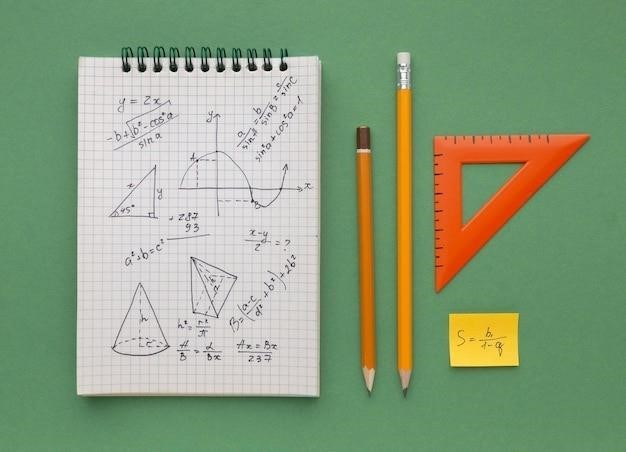
Algebra 1 Notes PDF⁚ A Comprehensive Guide
This comprehensive guide provides a detailed overview of Algebra 1‚ encompassing key concepts‚ essential resources‚ and effective study tips․ It covers everything from understanding the importance of Algebra 1 to utilizing online resources and practice questions to excel in the subject․
Introduction
Algebra 1 is a foundational course in mathematics that serves as a stepping stone to more advanced subjects․ It lays the groundwork for understanding abstract concepts and problem-solving techniques that are crucial in various fields‚ including science‚ engineering‚ and finance․ These notes aim to provide a comprehensive guide to Algebra 1‚ covering key concepts‚ essential resources‚ and effective study strategies․ Whether you’re a student seeking to enhance your understanding‚ a parent looking for supplementary materials‚ or an educator searching for resources to enrich your teaching‚ this guide is designed to support your learning journey in Algebra 1․
Understanding the Importance of Algebra 1
Algebra 1 is more than just a math course; it’s a gateway to higher-level mathematical concepts and a crucial foundation for success in STEM fields․ Mastering Algebra 1 equips you with essential problem-solving skills that extend beyond the classroom‚ making you a more analytical and logical thinker․ Algebraic concepts find applications in various real-world scenarios‚ from calculating interest rates and analyzing data to understanding scientific principles and designing computer programs․ A solid understanding of Algebra 1 not only opens doors to advanced math courses but also fosters critical thinking and problem-solving abilities that are valuable in numerous academic and professional pursuits․
Key Concepts Covered in Algebra 1
Algebra 1 lays the groundwork for advanced math by introducing fundamental concepts that serve as building blocks for higher-level topics․ These concepts include understanding equations and inequalities‚ exploring real numbers and their properties‚ delving into functions and their representations‚ mastering linear equations and systems of equations‚ and tackling quadratic equations and functions․ These foundational ideas are essential for comprehending more complex mathematical concepts and for applying them effectively in various fields‚ including science‚ engineering‚ and finance․
Equations and Inequalities
Equations and inequalities are fundamental concepts in algebra․ Equations represent a balance between two expressions‚ while inequalities express a relationship of order between two expressions․ Solving equations involves finding the value of an unknown variable that makes the equation true‚ while solving inequalities involves finding a range of values that satisfy the inequality․ In Algebra 1‚ students learn to solve various types of equations‚ including linear equations‚ quadratic equations‚ and absolute value equations‚ as well as linear inequalities‚ quadratic inequalities‚ and compound inequalities․ The ability to solve equations and inequalities is crucial for applying algebraic concepts in problem-solving and real-world applications․
Real Numbers and Their Properties
Real numbers form the foundation of algebra․ They encompass all rational and irrational numbers‚ including integers‚ fractions‚ decimals‚ and roots․ Understanding the properties of real numbers is essential for performing algebraic operations and solving equations․ These properties include the commutative‚ associative‚ and distributive properties for addition and multiplication‚ as well as the identity and inverse properties․ Students learn about the number line and how to represent real numbers on it‚ including their order and absolute value․ This section also explores the concept of sets and their operations‚ such as union‚ intersection‚ and complement․
Functions and Their Representations
Functions are fundamental in algebra‚ representing relationships between inputs and outputs․ Students learn to identify‚ define‚ and represent functions using various methods‚ including tables‚ graphs‚ and equations․ They explore different types of functions‚ such as linear‚ quadratic‚ and exponential functions‚ and understand their unique characteristics․ The concept of domain and range is introduced‚ defining the set of possible input and output values for a function․ Students also learn about function notation‚ using symbols like f(x) to represent the output of a function for a given input․ This section emphasizes how functions can be used to model real-world situations and solve problems involving relationships between variables․
Linear Equations and Systems of Equations
Linear equations‚ represented by a straight line when graphed‚ are a cornerstone of Algebra 1․ Students learn to solve linear equations in one variable‚ isolating the unknown variable using algebraic operations․ They also explore the concept of slope-intercept form‚ y = mx + b‚ which allows them to easily determine the slope and y-intercept of a line․ The notes cover solving systems of linear equations‚ which involves finding the solution that satisfies all equations simultaneously․ Methods like substitution and elimination are introduced to solve these systems‚ leading to understanding the concept of unique solutions‚ no solutions‚ or infinitely many solutions․ This section emphasizes how linear equations and systems can be used to represent and solve real-world problems involving relationships between variables․
Quadratic Equations and Functions

Quadratic equations‚ characterized by their highest power being 2‚ introduce students to a new level of complexity in Algebra 1․ The notes delve into solving quadratic equations using various methods‚ including factoring‚ completing the square‚ and the quadratic formula․ Students learn to identify the roots or solutions of quadratic equations‚ which represent the x-intercepts of the corresponding parabola․ The concept of the discriminant is introduced to determine the nature of the roots‚ whether they are real‚ imaginary‚ or equal․ This section also explores the properties of quadratic functions‚ including their graphs‚ vertex‚ axis of symmetry‚ and maximum or minimum values․ The notes emphasize how quadratic equations and functions are applied in real-world scenarios‚ such as projectile motion and optimization problems․
Resources for Algebra 1 Notes PDF
Finding reliable and comprehensive Algebra 1 notes is crucial for student success․ Fortunately‚ numerous resources are available to support learning․ Online platforms and websites offer a wealth of free and paid materials‚ including video tutorials‚ practice problems‚ and interactive exercises․ These resources cater to different learning styles and provide flexibility for students to access them at their own pace․ Textbook resources are essential for a structured approach to learning‚ providing detailed explanations‚ examples‚ and practice problems aligned with the curriculum․ University lecture notes‚ often shared by professors online‚ offer a deeper understanding of concepts and can be valuable for students aiming for higher-level math courses․ By leveraging these resources‚ students can build a solid foundation in Algebra 1 and enhance their understanding of the subject․
Online Platforms and Websites
The internet offers a vast repository of resources for Algebra 1 notes․ Online platforms like Khan Academy provide free video lessons‚ practice exercises‚ and interactive quizzes covering a wide range of topics․ Websites like MathPapa offer step-by-step solutions to algebra problems‚ helping students understand the process and learn from their mistakes; Other websites like PurpleMath and Algebra․com provide comprehensive notes‚ explanations‚ and worked-out examples for various algebra concepts․ These platforms allow students to access information anytime‚ anywhere‚ making learning more accessible and convenient․ By exploring these online resources‚ students can find the materials that best suit their learning style and pace‚ enhancing their understanding of Algebra 1․
Textbook Resources
Textbooks are a cornerstone of Algebra 1 learning‚ providing a structured and comprehensive approach to the subject․ Popular textbooks like “Holt Algebra 1 Texas Edition” and “Algebra 1” by McGraw-Hill Education offer detailed explanations of concepts‚ worked-out examples‚ and practice problems․ These resources are designed to guide students through the curriculum‚ reinforcing key concepts and building problem-solving skills․ Textbooks also often include supplementary materials like online access to practice exercises‚ quizzes‚ and interactive tutorials․ Students can leverage these resources to supplement their classroom learning‚ providing additional practice and clarification on challenging concepts․
University Lecture Notes
University lecture notes offer a valuable resource for students seeking a deeper understanding of Algebra 1 concepts․ These notes‚ often shared by professors and instructors‚ delve into more advanced topics and provide detailed explanations of complex mathematical principles․ They can be particularly helpful for students who are preparing for higher-level mathematics courses or who want to explore the subject beyond the typical high school curriculum․ While these notes may be more challenging than standard textbooks‚ they provide a valuable resource for students seeking a more in-depth understanding of Algebra 1․ Websites like Academia․edu often host a collection of university lecture notes‚ making these resources readily accessible to students․
Tips for Studying Algebra 1
Mastering Algebra 1 requires consistent effort and strategic learning․ Practice regularly to solidify concepts and build confidence․ Work through numerous problems from textbooks‚ online resources‚ and practice worksheets․ Don’t hesitate to seek help when you encounter difficulties․ Engage with your teacher‚ classmates‚ or online tutors to clarify concepts and address challenges․ Utilize online resources‚ such as Khan Academy‚ MathPapa‚ and Wolfram Alpha‚ to access interactive lessons‚ practice problems‚ and step-by-step solutions․ These resources can provide valuable support and enhance your understanding of Algebra 1 concepts․
Practice Regularly
Regular practice is the cornerstone of success in Algebra 1․ Consistent problem-solving reinforces concepts‚ builds fluency‚ and exposes you to different problem types․ Utilize textbooks‚ online resources‚ and practice worksheets to gain ample practice․ Aim to solve a variety of problems each day‚ focusing on areas where you struggle․ Don’t be afraid to revisit concepts you find challenging․ The more you practice‚ the more confident you will become in tackling Algebra 1 problems․ Remember‚ practice makes perfect‚ and consistent effort will lead to greater mastery of the subject․
Seek Help When Needed
Don’t hesitate to seek help if you encounter difficulties in Algebra 1․ Your teacher‚ classmates‚ or online resources can provide valuable support․ If you’re struggling with a particular concept‚ ask for clarification and work through examples together․ Don’t let confusion build up‚ as seeking help early can prevent significant setbacks․ Online platforms and websites offer tutorials‚ videos‚ and practice problems that can explain concepts in a different way‚ often with a more interactive approach․ Remember‚ asking for help is a sign of strength and a crucial step towards understanding the material․
Utilize Online Resources
The internet offers a wealth of resources for Algebra 1 students․ Online platforms‚ websites‚ and educational channels provide access to comprehensive notes‚ interactive tutorials‚ practice problems‚ and even virtual tutoring sessions․ These resources can supplement your textbook and classroom learning by offering alternative explanations‚ visual aids‚ and personalized practice․ Many websites offer free access to their content‚ while others require subscriptions or paid memberships․ Explore different platforms and find those that best suit your learning style and needs․ Utilize online resources to enhance your understanding of Algebra 1 concepts‚ practice problem-solving skills‚ and gain confidence in your abilities․
Algebra 1 is a foundational subject that lays the groundwork for higher-level mathematics․ By understanding the fundamental concepts‚ practicing regularly‚ seeking help when needed‚ and utilizing available resources‚ you can develop a strong foundation in algebra․ Remember‚ Algebra 1 is not just about memorizing formulas but about understanding the underlying principles and applying them to solve problems․ Embrace the challenge‚ embrace the learning process‚ and you will find that Algebra 1 can be a rewarding and empowering experience․




